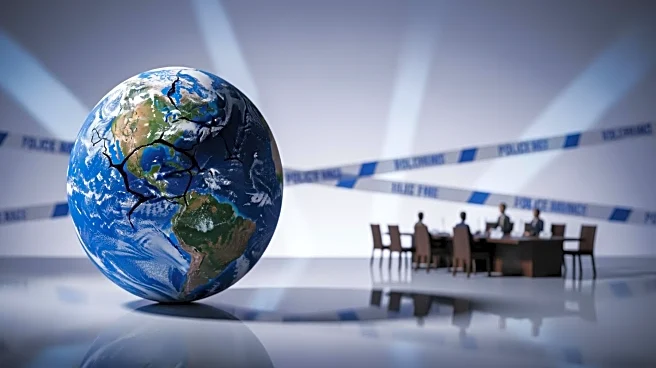What's Happening?
President Trump has been actively involved in the recent ceasefire negotiations in Gaza, applying significant pressure on Israeli Prime Minister Benjamin Netanyahu. This diplomatic effort resulted in the release
of Israeli hostages and Palestinian prisoners, alongside the initiation of aid into Gaza. Despite these developments, the summit in Sharm el Sheikh did not clarify the future administration of Gaza, the disarmament of Hamas, or Israel's potential actions regarding the West Bank. The summit, attended by world leaders, was marked by billboards featuring President Trump and Egyptian President Abdel Fattah el-Sisi, symbolizing a joint peace effort. However, the underlying causes of the conflict remain unaddressed, raising questions about the long-term effectiveness of the ceasefire.
Why It's Important?
The involvement of President Trump in the Gaza ceasefire negotiations highlights his influence in international diplomacy, particularly in Middle Eastern affairs. His ability to exert pressure on Prime Minister Netanyahu, more so than previous U.S. administrations, underscores his unique approach to foreign policy. The ceasefire, while a temporary relief, leaves unresolved issues that could impact regional stability. The lack of clarity on Gaza's administration and Hamas's disarmament poses risks of renewed conflict. Additionally, the international community's response to Israel's actions, including war crime charges against Netanyahu, could affect diplomatic relations and future peace efforts.
What's Next?
The future of Gaza remains uncertain, with key issues such as governance and disarmament unresolved. Stakeholders, including Israel, Palestine, and international mediators, must address these challenges to ensure lasting peace. The potential for Israel to resume military actions or annex the West Bank could reignite tensions. President Trump's continued involvement may influence the direction of these negotiations, but the absence of a comprehensive plan raises concerns about the sustainability of the ceasefire. Observers will be watching for any shifts in U.S. policy or further diplomatic engagements by President Trump.
Beyond the Headlines
The ethical implications of the ceasefire negotiations are significant, given the reported casualties and accusations of war crimes. The international community's role in addressing these issues is crucial for accountability and justice. The personalized nature of President Trump's diplomacy, focusing on deals with strongmen, may overlook deeper conflict causes, potentially undermining long-term peace efforts. The cultural and political dynamics in the region, influenced by external powers, continue to shape the prospects for resolution.









